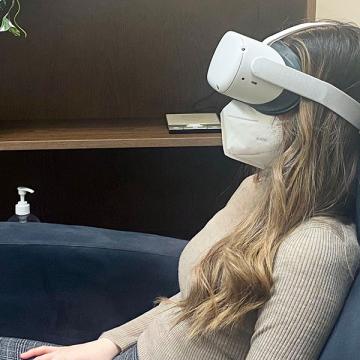
Virtual reality innovation in exposure therapy
What do you think of when you hear “virtual reality”? Virtual reality...
The UBC Interprofessional Health Mentors Program has reached a milestone, as 2021 marks 10 years of the program’s success in providing students with opportunities to learn from patient educators.
The Health Mentors program is a unique nine-month educational experience where teams of students from 12 different health programs learn from and with mentors living with a wide range of chronic conditions and disabilities. Students from audiology, clinical psychology, dentistry, dietetics, genetic counselling, nursing, kinesiology, medicine, occupational therapy, pharmacy, physical therapy, and speech-language pathology participate in the program.
Students can learn about a lot of different topics from lectures, but hearing a person’s actual story is, I believe, invaluable to their day-to-day practice as they start working in their field.
“Students can learn about a lot of different topics from lectures, but hearing a person’s actual story is, I believe, invaluable to their day-to-day practice as they start working in their field,” says Chris Hofley, who has been a health mentor since the program started in 2011. He was born with cerebral palsy and needs assistance with activities of daily living. Chris adds that the learning goes both ways. “Students from each profession also teach me so much as things evolve—about myself and how I can help others and give back to my community.”
Since 2011, 1,646 students and 200 mentors have participated in the Health Mentors program, which is coordinated by the Patient and Community Partnership for Education (PCPE, a unit with UBC Health). Interprofessional teams of students meet with their mentors to discuss stigma, the importance of the words we use, how to live with and manage chronic conditions, and patient-centred care. Students document their learning in online journals, which helps them develop reflective skills, consolidate their learning, and link theory to practice.
I also greatly valued the interprofessional space that the Health Mentors team put together. Learning how occupational therapists, nurses, and dentists approach the same clinical conundrums has been influential in my practice.
“The Health Mentors program engaged me to view how a patient experiences chronic disease and navigates the medical system. It also highlighted the supports patients have in community and how I can help support patients when they are in clinic,” says Seamus Hogan, who will be graduating from the Doctor of Medicine program this spring. “I also greatly valued the interprofessional space that the Health Mentors team put together. Learning how occupational therapists, nurses, and dentists approach the same clinical conundrums has been influential in my practice.”
At the end of the program, groups share their learning with other students, faculty, and community members through a symposium. This year’s symposium was held virtually in March and was attended by nearly 300 students, mentors, faculty, and guests.
“Our long-term follow up study published in the journal Academic Medicine shows how the program prepares students for the increasingly complex world of 21st century healthcare by helping them develop a professional identity that embraces patient partnership, interprofessional collaboration, and patient-centred practice,” says Angela Towle, Co-Director of PCPE. Read the study for further details.
The Health Mentors program has helped to remind me to slow down and understand the journey and experience that each patient brings when they access care.
Elise Fagnan, a registered nurse working in pediatric mental health, agrees the program has influenced her practice.
“It taught me a lot about the way our healthcare system works, the gaps in it, and how we can help bridge and be sensitive to some of those gaps during our careers,” she says. “It gave me a different lens to look through when trying to understand the patient experience, and I always try to apply what I’ve learned. The Health Mentors program has helped to remind me to slow down and understand the journey and experience that each patient brings when they access care.”
Explore the Health Mentors program and hear what other mentors and students have said about their experiences.
Posted April 19, 2021